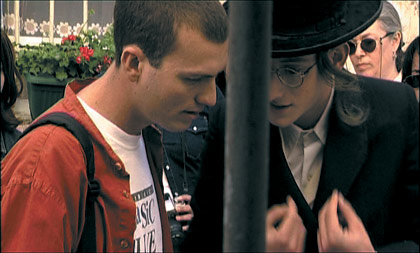Filmmaking in Israel has undergone major
developments since its inception in the 1950s. The first features
produced and directed by Israelis such as "Hill 24 Does Not Answer," and
"They Were Ten," tended, like Israeli literature of the period, to be
cast in the heroic mold.
Photo courtesy Ma'aleh School of Television Film and the Arts
Some recent films remain deeply rooted in the Israeli experience,
dealing with such subjects as Holocaust survivors and their children
(Gila Almagor's "The Summer of Aviya"and its sequel, "Under the Domim
Tree") and the travails of new immigrants ("Sh'hur", directed by Hannah
Azoulai and Shmuel Hasfari, "Coffee with Lemon," directed by Leonid
Gorivets). Others reflect a more predominant trend towards the present
Israeli reality, whether dealing with the Israel-Arab confrontation (Uri
Barbash's "Beyond the Walls") or set in the context of universalist,
somewhat alienated and hedonistic society ("A Siren's Song," "Life
According to Agfa," "Tel Aviv Stories").
In 2009, the Arab-Israeli film "Ajami,"
set in an impoverished Arab neighborhood in Yafo, won a nomination for
the Academy Award for Best Foreign Language Film. It was the first
predominantly Arab-language film that Israel submitted for the award and
the third year in a row that an Israeli film won an Oscar nomination.
A year earlier, Ari Folman’s animated "Waltz with Bashir" reaped
international acclaim for its portrayal of the director’s experiences in
the 1982 Lebanon War. Awards for the film included the Golden Globe
Award for Best Foreign Language Film and an Academy Award nomination.
Other notable films of the last few years are Joseph (Yossi) Cedar's
"Campfire," about a religious-Zionist Jerusalemite family in the 80s who
struggle to re-establish a family dynamic after the death of their
father, and "Broken Wings", Nir Bergman's award-winning film that also
deals with the aftermath of familial loss and the need for acceptance.
"Turn Left At The End of The World" deals with unlikely cross-cultural
friendships in an immigrant desert town, and "Aviva, My Love," garnered
10 awards in Israel, Shanghai, and Tokyo.
Eytan Fox is another noteworthy and popular director. Fox's movies
include "The Bubble," which explores contemporary urban life in Tel Aviv
against the backdrop of the Arab-Israeli conflict, "Yossi and Jagger"
about homosexual love and desire in the IDF, and "Walk on Water." Fox
was also the director of the classic "Florentine" TV series (1997),
about disillusioned young Israelis living in a shabby-chic Tel Aviv
neighborhood.
 Photo courtesy Ma'aleh School of Television Film and the Arts
Photo courtesy Ma'aleh School of Television Film and the Arts